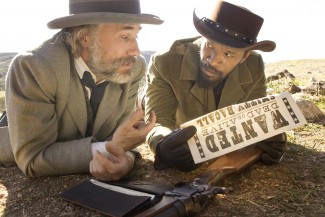Tarantino’s ‘Django Unchained’ features a man searching for his wife and some revenge

Quentin Tarantino is not everyone’s cup of cinematic tea. His movies feature stylized violence, raw language and near-obsessive homages to genres of the past. For those who enjoy his mighty, mighty tomes, each new film feels like an entry card into another section of his brain. His latest is Django Unchained, one of his most controversial movies, featuring a slave on the hunt to find both his wife and some revenge in the American South. It’s a brutal film, but one that imprints certain images on the mind, unable to forget, unable to look away. It’s as uncomfortable and masterful an effort as Inglorious Basterds.
Oscar winner Jamie Foxx plays Django, a silent man who occasionally likes to remind his enemies that the “D” is silent. He’s freed from the shackles of a couple of sadistic men by Dr. King Schultz (Oscar winner Christoph Waltz), a German bounty hunter masking himself as a dentist. The two team up to nab some bad guys and find Django’s wife, Broomhilda (Kerry Washington). From point A to point B, there’s a lot of bloodshed and racial invective. Several of the characters, including Don Johnson as a plantation owner, won’t take Django seriously. But when looking down the business end of a rifle, they tend to change their mind.
This Wizard of Oz-like journey ends at the estate of Calvin Candie (Leonardo DiCaprio), a ruthless owner of a plantation known as Candyland. It is here that Schultz and Django make their last stand, for no other reason than Broomhilda is one of the slaves on the plantation.
It will be up to individual audience members whether the violence is too much to handle. It’s certainly bloody and gruesome, but it’s also that stylized violence featured in the Kill Bill series. When a character is shot, an ungodly amount of blood spurts out like a geyser. Tarantino is much more interested in rhythm and visuals than shocking us with violent acts.
The racism of some of the characters can also be unendurable, especially the deranged exploits of Calvin Candie, perhaps the most sadistic of all. To make our way through these scenes, Tarantino has given much dialogue to the Schultz character. Perhaps he’s meant to be a stand-in for a modern-day audience member, a man removed from the hatred and able to condemn it. Still, there are times I needed to look away or at least squint at the pain on display.
The acting is unanimously visceral, especially from Waltz. Schultz is so integral to the story that it’s a wonder why this character is being treated as a “supporting role” by both the Golden Globes and Academy Awards. To be sure, Django is the main character, but Schultz is with him the entire way, coaxing him into more bounties before ultimately finding Broomhilda.
DiCaprio is scary in a performance that takes a lot of skill. Foxx is somewhat detached from the action, offering an introspective character who keeps his eyes set on finding his wife. It’s a subtle performance (yes, even in a Tarantino film, there’s room for subtlety), and should certainly be ranked as one of the actor’s finest.
Of the many supporting roles, Samuel L. Jackson is almost unrecognizable as Candie’s righthand servant, an elderly man more inclined to help the plantation owner than see Django and Broomhilda reunited.
The cinematography and art direction, all evoking the American West, is beautiful. Tarantino knows how to amass a team of professionals to lens a film with unique beauty.
Django Unchained doesn’t leave you with excitement, like a typical action movie. Because of the subject matter, this one is hard to overly appreciate, but there’s no denying that all of the elements for a quality film have fallen into place.
By John Soltes / Publisher / John@HollywoodSoapbox.com
-
Django Unchained
-
2012
-
Written and directed by Quentin Tarantino
-
Starring Jamie Foxx, Christoph Waltz, Samuel L. Jackson, Leonardo DiCaprio, Don Johnson, Kerry Washington and Tom Wopat
-
Running time: 165 minutes
-
Rated R for strong graphic violence, language and some nudity
-
Rating:





